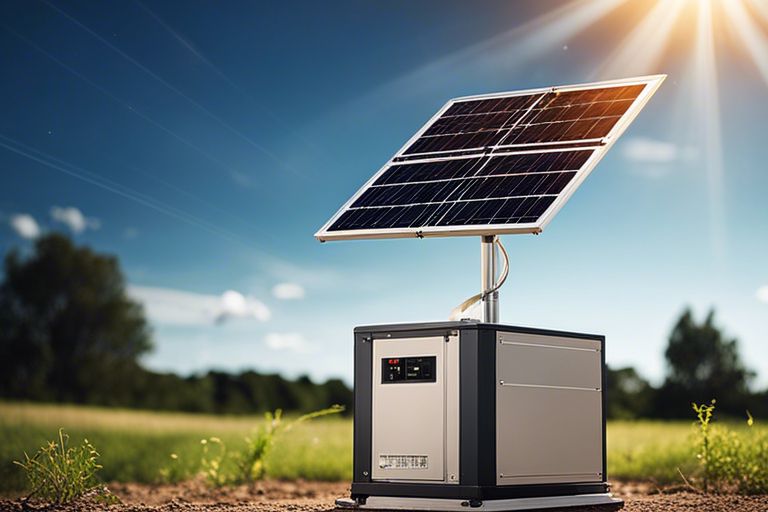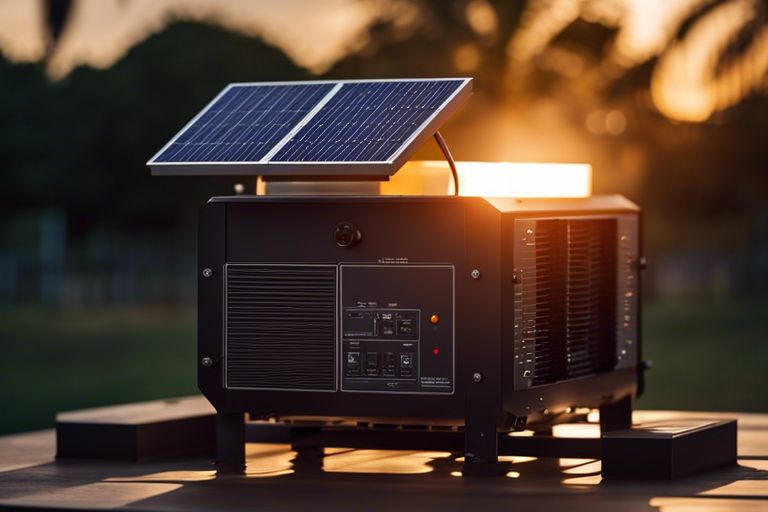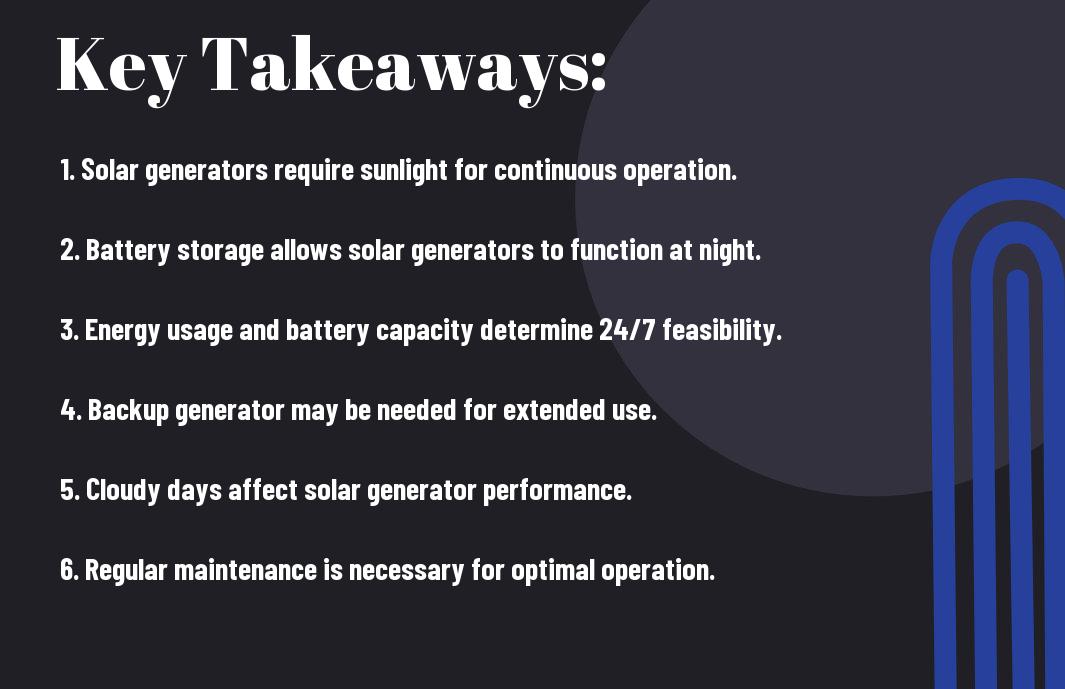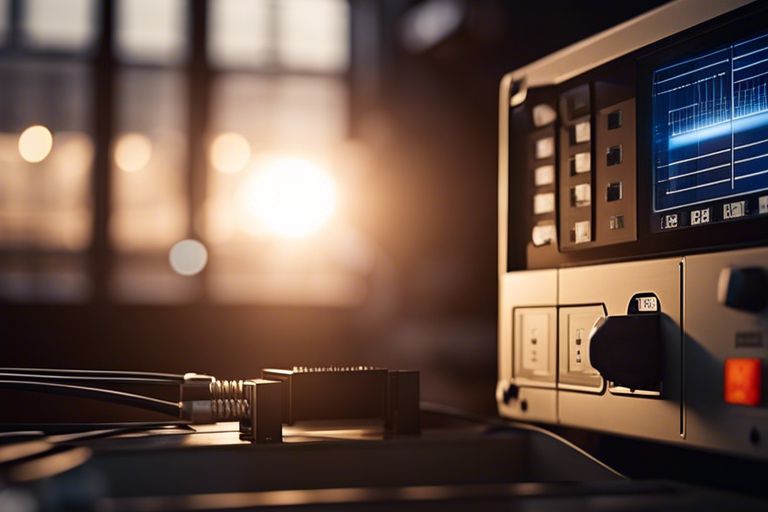There’s a growing interest in utilizing solar generators for continuous power supply, but the question remains – can you run a solar generator 24/7? Let’s research into the factors that determine the feasibility of running a solar generator round the clock, including battery capacity, solar panel efficiency, and energy consumption patterns. By understanding these key elements, you can make an informed decision on whether a solar generator can meet your 24/7 power needs.
Key Takeaways:
- Solar generators can run 24/7 if they have sufficient battery storage capacity to store excess energy produced during the day for use at night.
- The size of the solar panels and the capacity of the battery are crucial factors in determining if a solar generator can run continuously.
- Energy consumption needs to be carefully managed to ensure the solar generator can operate 24/7 without running out of stored energy.
- Regular maintenance of the solar panels and battery is important to ensure optimal performance and longevity of the system.
- Consider backup power sources for prolonged periods of cloudy weather or low sunlight to ensure uninterrupted power supply from the solar generator.
What is a Solar Generator?
While you may have heard about solar generators, you may not fully understand what they are and how they work. Let’s probe into the world of solar generators to demystify this renewable energy source.
Definition and Principles
Generator: A solar generator is a device that captures sunlight using photovoltaic cells to convert it into electricity. This electricity is stored in a battery for later use when sunlight is not available. The key principle behind a solar generator is harnessing the power of the sun to create sustainable and eco-friendly energy for your various needs.
Types of Solar Generators
For those looking to invest in a solar generator, it’s crucial to understand the different types available in the market. Here is a breakdown of the various types of solar generators:
| Portable Solar Generators | Stationary Solar Generators |
| RV Solar Generators | Backup Solar Generators |
| Solar Generator Kits | Solar Generator Systems |
| Solar Generator Power Banks | Solar Generator Chargers |
| Solar Generator with Inverter | Solar Generator with Battery |
For those looking to invest in a solar generator, it’s crucial to understand the different types available in the market. Portable Solar Generators are convenient for on-the-go energy needs, while Stationary Solar Generators are ideal for home or business use. RV Solar Generators are specifically designed for recreational vehicles, providing power while on the road. Backup Solar Generators serve as a reliable source of electricity during power outages or emergencies. Solar Generator Kits and Systems come with all the necessary components for easy installation and use. Solar Generator Power Banks and Chargers offer portable solutions for charging your devices on the move. Solar Generators with Inverters and Batteries provide additional features and capabilities for enhanced energy usage.
Can You Run a Solar Generator 24/7?
Theoretical Possibility
Some may wonder if it’s possible to run a solar generator 24/7, considering the intermittent nature of solar power. In theory, it is possible to run a solar generator 24/7 by utilizing energy storage solutions such as batteries. During the day, the solar panels can convert sunlight into electricity to power your devices and simultaneously charge the batteries. Then, during the night or when sunlight is not available, the stored energy in the batteries can be used to keep your generator running.
Practical Limitations
The practical limitations of running a solar generator 24/7 mainly revolve around the battery capacity and the energy consumption of your devices. Any solar generator system you set up should be able to generate enough electricity during the day to both power your devices and store excess energy in the batteries for use when the sun is not shining. Additionally, you need to consider the energy consumption of your devices to ensure that the batteries can sustain the load for 24 hours a day.
Limitations such as inclement weather, shading on the solar panels, and the efficiency of the system can also impact the continuous operation of a solar generator. It’s crucial to evaluate your energy needs, choose the right components for your solar generator system, and consider backup charging options to overcome any practical limitations you may encounter.
Factors Affecting Continuous Operation
All factors must be considered when determining if you can run a solar generator 24/7. Several key elements can impact the continuous operation of your solar generator including solar panel efficiency, battery capacity and type, inverter quality and capacity, as well as load management and sizing. These factors must be carefully evaluated to ensure a seamless and uninterrupted power supply.
Solar Panel Efficiency
The efficiency of your solar panels plays a crucial role in the continuous operation of your solar generator. The higher the efficiency of your panels, the more energy they can convert from sunlight. This means that with highly efficient solar panels, you can generate more power throughout the day, which is important for running your generator 24/7. Factors such as the angle of installation, shading, and weather conditions can also affect the overall efficiency of your solar panels.
- Ensure proper installation and positioning of solar panels
- Minimize shading and obstructions to maximize sunlight absorption
- Regularly clean and maintain your solar panels for optimal performance
Though solar panel efficiency is vital, it can be influenced by external factors that may impact the continuous operation of your solar generator.
Battery Capacity and Type
Affecting the ability to run your solar generator continuously, the capacity and type of battery are critical components to consider. The battery capacity determines how much energy your system can store, allowing you to power your devices during periods of low sunlight or at night. Additionally, the type of battery used can impact its lifespan, charging efficiency, and overall performance.
It is important to choose a battery with adequate capacity and the right type to support the continuous operation of your solar generator. Lithium-ion batteries are commonly preferred for solar applications due to their high energy density, longer lifespan, and faster charging capabilities.
Inverter Quality and Capacity
Quality inverters are important for the continuous operation of your solar generator as they convert the direct current (DC) generated by the solar panels into usable alternating current (AC) power for your devices. The quality and capacity of the inverter can affect the efficiency of your system and its ability to handle heavy loads.
Quality inverters are designed to be more reliable, efficient, and durable, ensuring a stable power supply for your devices. Choosing an inverter with the appropriate capacity for your system’s power requirements is crucial to running your solar generator 24/7.
Load Management and Sizing
Type, sizing, and management of the loads connected to your solar generator also impact its continuous operation. Properly sizing your system to meet the power demands of your devices is important to avoid overloading the system and ensure uninterrupted power supply.
Another critical aspect is the efficient management of your loads to prioritize important devices and distribute power effectively. By optimizing load management and sizing, you can enhance the performance and reliability of your solar generator for continuous operation.
When considering running a solar generator 24/7, make sure to evaluate these factors carefully to ensure a seamless and uninterrupted power supply for your needs.
Real-World Examples and Applications
Off-Grid Homes and Cabins
Keep in mind that running a solar generator 24/7 for off-grid homes and cabins is possible with careful planning and proper system sizing. Any off-grid property can benefit from a solar generator that can provide continuous power, especially in remote locations where traditional grid connections are not available. By utilizing battery storage, you can ensure a constant power supply even during periods of low sunlight.
RVs and Campers
Real-world examples show that solar generators can effectively power RVs and campers 24/7, allowing you to enjoy off-grid adventures without worrying about running out of power. With the right solar generator setup, you can run your appliances, charge your devices, and light up your space wherever your journey takes you. Off-grid camping enthusiasts find solar generators to be a convenient and eco-friendly power solution for their mobile lifestyle.
For those looking to explore the great outdoors without sacrificing modern conveniences, solar generators offer a reliable and sustainable power source for RVs and campers. By harnessing the sun’s energy, you can enjoy the freedom of off-grid living while staying connected and powered up during your travels.
Remote Communication Towers
Off-grid communication towers rely on solar generators to run 24/7 and ensure uninterrupted connectivity in remote locations. An crucial part of modern infrastructure, these towers use solar power to keep communication networks up and running without the need for a constant grid connection. Remote communication tower operators trust solar generators to provide reliable and sustainable power for their critical operations.
An crucial aspect of using solar generators for remote communication towers is the ability to integrate them seamlessly into existing power systems. By combining solar energy with battery storage and backup generators, towers can maintain continuous operation even in challenging environmental conditions. Towers in remote areas heavily depend on solar generators to keep vital communication services running smoothly around the clock.
Emergency Backup Power Systems
On top of regular power systems, emergency backup systems can utilize solar generators to provide reliable 24/7 power during crises. Systems designed for emergency situations often incorporate solar generators to ensure a constant power supply in case of grid failure or natural disasters. Whether it’s powering emergency equipment, communication devices, or lighting, solar generators play a crucial role in keeping crucial services operational during emergencies.
Overcoming Challenges and Limitations
Energy Storage Solutions
Solutions for running a solar generator 24/7 include energy storage solutions such as batteries. By storing excess energy generated during the day, you can tap into this stored energy during periods of low sunlight or at night. Advanced battery technologies like lithium-ion batteries can provide reliable energy storage for continuous power supply.
Grid Tie Systems and Net Metering
On cloudy days or when your energy demand exceeds what your solar generator can produce, you can rely on grid tie systems and net metering. These systems allow you to connect your solar generator to the grid, supplementing your energy needs when necessary. Net metering also enables you to earn credits for excess energy generated and fed back into the grid, further enhancing the viability of running your solar generator 24/7.
Another benefit of grid tie systems and net metering is the potential cost savings. By utilizing the grid when needed and earning credits for excess energy production, you can reduce your overall energy costs and maximize the efficiency of your solar generator system.
Generator Maintenance and Monitoring
Metering your solar generator’s performance and maintaining it regularly are crucial aspects of ensuring continuous operation. Monitoring tools can track the energy production of your system, alerting you to any issues that may affect its efficiency. Regular maintenance, such as cleaning the panels and checking for any malfunctions, can help prevent downtime and keep your solar generator running smoothly.
Maintenance tasks may include inspecting the wiring, checking for any shading on the panels, and ensuring all components are functioning correctly. By staying proactive with maintenance and monitoring, you can address any issues promptly and optimize the performance of your solar generator for 24/7 operation.
Safety Considerations and Precautions
Unlike How much Solar Power we would need for 5 Dell Servers to run 24×7, running a solar generator 24/7 comes with its own set of safety considerations and precautions that you need to be aware of.
Electrical Shock and Fire Hazards
With continuous operation, the risk of electrical shock and fire hazards increases. It’s vital to ensure that all electrical connections are secure and insulated properly to prevent any mishaps. Regularly inspecting your system for any signs of wear and tear can help mitigate these risks.
Battery Safety and Handling
Shockingly, improper handling of batteries can pose serious dangers. Always follow the manufacturer’s guidelines for charging and storing batteries. Avoid overcharging or exposing batteries to extreme temperatures, as this can lead to malfunctions or even explosions.
A well-ventilated area is crucial for battery storage to prevent the accumulation of potentially hazardous gases. Make sure to keep batteries away from flammable materials and consider investing in a battery management system for added safety.
Weather-Related Risks and Protections
For your solar generator to run 24/7, you must also consider weather-related risks such as lightning strikes, strong winds, and heavy rains. Installing surge protectors and lightning arrestors can safeguard your system from sudden power surges during storms.
Another protective measure is to use weatherproof enclosures for crucial components of your solar generator to shield them from the elements. Regular maintenance and inspections after severe weather events can help identify and address any potential issues promptly.
Summing up
To wrap up, running a solar generator 24/7 can be a challenging task due to the limitations of solar energy. While solar generators can provide a sustainable and environmentally friendly source of power, it’s important to consider factors such as battery storage, energy consumption, and weather conditions. With proper planning and usage, you can maximize the efficiency of your solar generator and enjoy reliable power generation for extended periods of time.
Q: Can you run a solar generator 24/7?
A: Yes, you can run a solar generator 24/7 as long as you have sufficient battery storage capacity to store excess energy generated during the day for use during the night or cloudy days.
Q: How long can a solar generator run continuously?
A: The duration a solar generator can run continuously depends on factors such as the size of the solar panels, the battery capacity, the energy consumption of the devices connected to it, and the amount of sunlight available for recharging. With adequate planning and sizing, a solar generator can potentially run indefinitely.
Q: Do I need to turn off my solar generator at night?
A: It is not necessary to turn off your solar generator at night if it has sufficient battery storage to continue powering your devices. However, if your energy consumption exceeds the stored energy in the batteries, you may need to conserve energy or have a backup power source for continuous operation.



